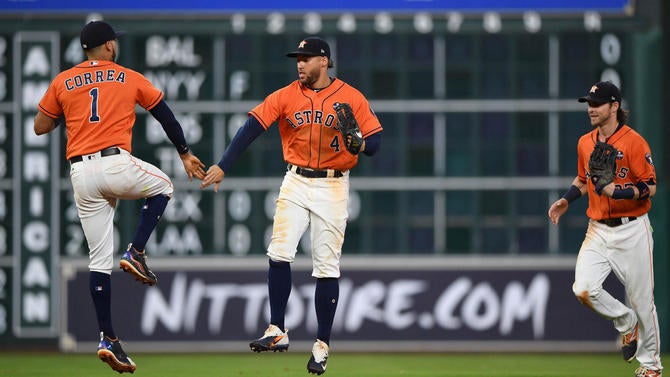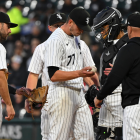On Thursday, the American League Divisional Series between the Boston Red Sox and Houston Astros will begin.
Here's what you need to know about the series:
Regular season favored Astros
The Red Sox and Astros played seven times during the regular season, with the Astros taking four of those games. Houston outscored Boston by 13 runs, although that total is skewered by a 10-run victory during last week's four-game set. In the other six games, the two teams were separated by three runs. History, then, suggests this series will feature some close games.
The ball will be in play
Viewers who dislike watching batter after batter go down on strikes should rest easy knowing the Red Sox and Astros were among the best teams at avoiding the K. Houston finished with the lowest strikeout rate in the majors -- that despite leading the sport in ISO. Boston was also among the best at putting the ball in play, though they finished with the worst ISO.
Predictably, perhaps, the Astros had the best offense in the majors, according to Baseball Prospectus' True Average metric, which is their catch-all offensive metric that's scaled to batting average (as opposed to wOBA, which is is scaled to OBP) and is ballpark adjusted. The Red Sox, on the other hand, finished in the bottom 10. The disparity isn't as jarring through more traditional means. The Astros scored a majors-best 896 runs as compared to the Red Sox' 785, which was good for 10th.

Signal and noise
There's a reason the Red Sox made the postseason despite their offensive struggles -- this team can pitch. There's a reason the Astros won 101 games and were one of the most complete teams in the majors -- they can pitch, too. Both pitching staffs have a number of well-known stars, and this isn't a case where the Q scores exceed the on-the-field production by any means.
BP's Deserved Run Average metric has both the Red Sox and Astros' rotations and bullpens as top-10 units. Moreover, this series is set to feature the pitchers ranked No. 2 (Chris Sale), No. 8 (Justin Verlander), and No. 14 (Dallas Keuchel) in WARP. Add in Brad Peacock and Drew Pomeranz (both of whom ranked in the top 40), as well as top-notch relievers like Craig Kimbrel and Ken Giles, and this series will be a must-watch for fans of good pitching.
About the managers
The matchup between Boston's John Farrell and Houston's A.J. Hinch lends itself to easy narratives about young versus old (the 55-year-old Farrell is nearly 12 years older), novice versus experienced (Farrell has managed 13 more postseason games).
But these two are more alike than not in managerial styles.
Consider that neither manager is likely to bunt. That both teams finished in the bottom-five in pinch-hitters used, and that neither likes to issue an intentional walk -- though both will play around with the hit-and-run when they deem it worthwhile.
The biggest stylistic difference between the two might be that Hinch's Astros are far, far more likely to put on a defensive shift.
The running game
We'll end with one more similarity between these teams: they each finished in the top eight in the majors in stolen bases. The Red Sox have Mookie Betts, Andrew Benintendi, Rajai Davis, Eduardo Nunez and Xander Bogaerts to worry about once they reach base. Meanwhile, the Astros boast Jose Altuve and Alex Bregman, who combined for 49 steals on 60 tries.
Conditions should be good for stolen-base attempts. Although Boston's catching tandem of Christian Vazquez and Sandy Leon post above-average in pop times, the Red Sox pitchers are slow to the plate as a whole. The Astros' catchers -- primarily Brian McCann, but with contributions from Evan Gattis -- are slower at getting the ball to second base than their counterparts. It almost doesn't matter, since Houston's pitchers are also slow to the plate.
During the regular season, the Astros allowed the fifth-most steals in baseball while throwing out just 12 percent of attempted thieves. The Red Sox -- in part because their staff features so many lefties -- gave up the third-least number of steals.






















